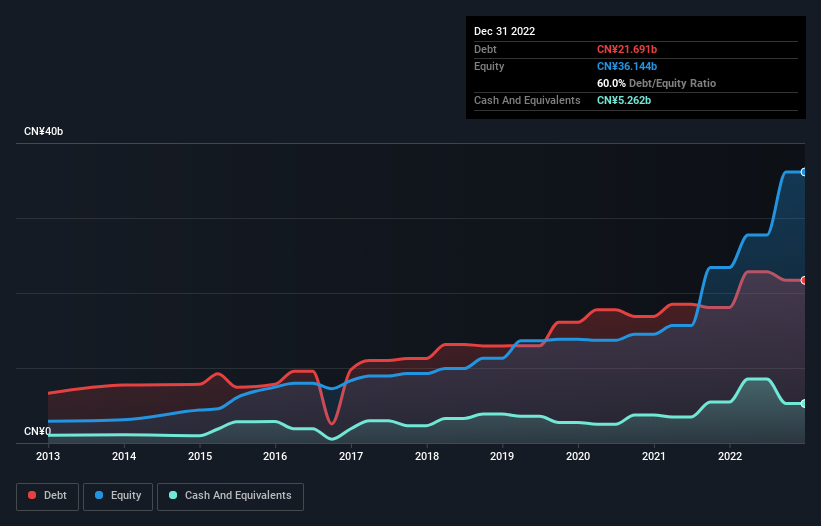- Hong Kong
- /
- Construction
- /
- SEHK:1799
These 4 Measures Indicate That Xinte Energy (HKG:1799) Is Using Debt Extensively

Some say volatility, rather than debt, is the best way to think about risk as an investor, but Warren Buffett famously said that 'Volatility is far from synonymous with risk.' So it might be obvious that you need to consider debt, when you think about how risky any given stock is, because too much debt can sink a company. Importantly, Xinte Energy Co., Ltd. (HKG:1799) does carry debt. But is this debt a concern to shareholders?
What Risk Does Debt Bring?
Generally speaking, debt only becomes a real problem when a company can't easily pay it off, either by raising capital or with its own cash flow. If things get really bad, the lenders can take control of the business. However, a more common (but still painful) scenario is that it has to raise new equity capital at a low price, thus permanently diluting shareholders. Of course, the upside of debt is that it often represents cheap capital, especially when it replaces dilution in a company with the ability to reinvest at high rates of return. When we think about a company's use of debt, we first look at cash and debt together.
See our latest analysis for Xinte Energy
What Is Xinte Energy's Debt?
You can click the graphic below for the historical numbers, but it shows that as of December 2022 Xinte Energy had CN¥21.7b of debt, an increase on CN¥18.1b, over one year. However, because it has a cash reserve of CN¥5.26b, its net debt is less, at about CN¥16.4b.

How Healthy Is Xinte Energy's Balance Sheet?
The latest balance sheet data shows that Xinte Energy had liabilities of CN¥23.9b due within a year, and liabilities of CN¥19.2b falling due after that. On the other hand, it had cash of CN¥5.26b and CN¥16.7b worth of receivables due within a year. So it has liabilities totalling CN¥21.1b more than its cash and near-term receivables, combined.
This deficit is considerable relative to its market capitalization of CN¥22.5b, so it does suggest shareholders should keep an eye on Xinte Energy's use of debt. Should its lenders demand that it shore up the balance sheet, shareholders would likely face severe dilution.
We use two main ratios to inform us about debt levels relative to earnings. The first is net debt divided by earnings before interest, tax, depreciation, and amortization (EBITDA), while the second is how many times its earnings before interest and tax (EBIT) covers its interest expense (or its interest cover, for short). Thus we consider debt relative to earnings both with and without depreciation and amortization expenses.
Xinte Energy has a low net debt to EBITDA ratio of only 0.83. And its EBIT easily covers its interest expense, being 27.2 times the size. So we're pretty relaxed about its super-conservative use of debt. Better yet, Xinte Energy grew its EBIT by 150% last year, which is an impressive improvement. That boost will make it even easier to pay down debt going forward. The balance sheet is clearly the area to focus on when you are analysing debt. But ultimately the future profitability of the business will decide if Xinte Energy can strengthen its balance sheet over time. So if you want to see what the professionals think, you might find this free report on analyst profit forecasts to be interesting.
Finally, a company can only pay off debt with cold hard cash, not accounting profits. So we always check how much of that EBIT is translated into free cash flow. Over the last three years, Xinte Energy saw substantial negative free cash flow, in total. While investors are no doubt expecting a reversal of that situation in due course, it clearly does mean its use of debt is more risky.
Our View
While Xinte Energy's conversion of EBIT to free cash flow has us nervous. For example, its interest cover and EBIT growth rate give us some confidence in its ability to manage its debt. We think that Xinte Energy's debt does make it a bit risky, after considering the aforementioned data points together. That's not necessarily a bad thing, since leverage can boost returns on equity, but it is something to be aware of. When analysing debt levels, the balance sheet is the obvious place to start. But ultimately, every company can contain risks that exist outside of the balance sheet. To that end, you should learn about the 3 warning signs we've spotted with Xinte Energy (including 2 which are concerning) .
If, after all that, you're more interested in a fast growing company with a rock-solid balance sheet, then check out our list of net cash growth stocks without delay.
New: AI Stock Screener & Alerts
Our new AI Stock Screener scans the market every day to uncover opportunities.
• Dividend Powerhouses (3%+ Yield)
• Undervalued Small Caps with Insider Buying
• High growth Tech and AI Companies
Or build your own from over 50 metrics.
Have feedback on this article? Concerned about the content? Get in touch with us directly. Alternatively, email editorial-team (at) simplywallst.com.
This article by Simply Wall St is general in nature. We provide commentary based on historical data and analyst forecasts only using an unbiased methodology and our articles are not intended to be financial advice. It does not constitute a recommendation to buy or sell any stock, and does not take account of your objectives, or your financial situation. We aim to bring you long-term focused analysis driven by fundamental data. Note that our analysis may not factor in the latest price-sensitive company announcements or qualitative material. Simply Wall St has no position in any stocks mentioned.
About SEHK:1799
Xinte Energy
Engages in the research and development, production, and sale of polysilicon in the People’s Republic of China.
Reasonable growth potential with adequate balance sheet.
Similar Companies
Market Insights
Community Narratives




